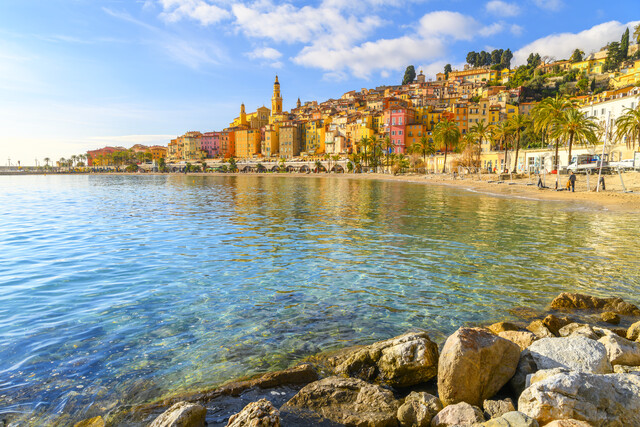| Word of Mouth |
But despite the popularity of the Internet, old-fashioned word-of-mouth is the basic foundation of many popular rating systems that offer consumers guidelines on the quality of their travel accommodations, whether those accommodations are airline travel, hotel accommodations, restaurants, or entertainment.
Ratings are extremely important in the travel industry and are designed to generate business, customers, and positive feedback. Ratings may be used to define everything from the smell of your hotel room, to the amenities provided in the bathroom. Ratings are available for world-class resorts, local motels, restaurants, campgrounds, and various entertainments and attractions.
| Internet Rating Systems |
For example, the star ratings defined by the AAA range from one diamond to five diamonds. Briefly, a one-diamond rating was basically meant to define the accommodations that provided essential but "no-frills accommodations" - meaning a basically clean, comfortable, and hospitable accommodation.
A 5-diamond rating defines luxury and sophistication. Such ratings judge first-class service, expectations, and impeccable standards of excellence. Also included in such considerations are the number and quality of amenities, as well as personalized services offered by a hotel or facility.
Most properties found domestically and abroad generally ranged between the 3- and 4-diamond ratings. These ratings take into consideration the appearance and appeal of hotel rooms, restaurant menus, and amenities.
Campground ratings range between a 1 and a 3. Campgrounds rated with a 1 designate rustic and limited facilities -- such as bathrooms and showers -- while those rated with a 3 offer recreational options, a variety of general service facilities, such as laundry rooms, showers, bathrooms, and even a grocery store or nightly movies.
However, most travel providers found on the Internet, as well as hotels themselves, have created a mishmash of ratings that often cause confusion among consumers. The most popular travel-rated websites used today -- Travelocity, Hotwire, Expedia, Sidestep, Orbitz, Priceline.com, and Hotels.com -- offer their own renditions of different rating systems.
Check out these statistics of ratings offered to the Hilton Hotel at Chicago's O'Hare Airport. Expedia rated the hotel as a 3, as did Travelocity, Orbitz, and AAA. However, Priceline, Hotwire and Travelweb all gave the Hilton Chicago O'Hare Airport hotel a 4-star rating. What gives?
Obviously, criteria for a 4-star hotel ranking differ between service providers. For example, AAA will offer a 4-star hotel ranking only if the establishment offers increasingly stylish and refined accommodations. The level of quality, amenities, and exquisite attention to detail, service, and hospitality are also measured.
However, Priceline.com will offer a 4-star rating to a hotel that offers remote control TV with premium channels, radio alarm clock, telephone with voice mail, fitness center access, a hair dryer, an iron and ironing board, room service, a concierge, and 24-hour service at the front desk.
| Airline Ratings |
A 5-star rating by Skytrax recognizes a specific airline for excellence in service delivery and product, and is often judged by its ability to set trends that are followed by other airline carriers. Ratings are also developed and offered for staff service delivery for in-flight and airport environments. Most star rating categories of airline carriers belong to the 3-, 4-, or 5-star rating categories.
| Travel Agent Guidelines |
The travel agent should be able to explain to clients the various aspects involved in ranking or rating, if asked, and should always err on the side of caution when recommending accommodations or restaurants by getting on the phone and making contact with such establishments to ask specific and direct questions.
Whether your customers want to travel by rail, car, or air, the hotel agent is obligated to understand how each of these systems are ranked, utilizing online and well as print technology to determine the quality of each establishment that will suit the client's needs, expectations, and budget.
| Conclusion |
| Introduction |
| Today's CRS |
|
What is a computerized reservation system? These are defined as computer systems that allow real-time access to schedules, airline travel fares, booking reservations, ticketing options and seating availability, and more. The computerized reservation system is also called a global distribution system (GDS). |
In the early years of the new century, the United States Department of Transportation suggested revising the regulations that govern the use of computer reservation systems in order to help meet the changes of online access, as well as airline ownership, distribution, and use.
The most popular computer reservation systems used in the United States include:
-
Amadeus
-
Sabre
-
Galileo
-
Worldspan
Delta Airlines, Northwest, and TWA founded Worldspan in 1990. It provided global travel information via electronic distribution on the Internet. Worldspan offers its database to home-based travel agents by remote access and provides a variety of reservation products. Agents are able to offer clients real-time reservations interface and booking engine options from their website.
Sabre used to be owned by American Airlines and is widely used by travel agents using conventional dial-up, as well as Internet access, for both agency and home-based travel agents.
Galileo International offers a variety of products for the travel industry much like Worldspan and Sabre, and also offers access to tour and cruise operator booking engines.
Amadeus has been operating since 1992 and is co-owned by both private airlines -- including Air France, Lufthansa, and Iberia -- as well as public stockholders. Amadeus is a popular international travel agency database that offers Internet-based reservation systems for home-based travel agents, as well as automation projects and features used by agents around the world.
Most travel agents rely on at least one of these services, and often utilize a combination to provide clients with access to detailed flight information and options. Indeed, major airlines have increased their online selling options, which generate and offer travel agents constant competition for services. As a matter of fact, Sabre and Galileo are no longer controlled by any one airline system, though a large number of Internet distribution systems for airline travel depend on the CRS for reliable, up-to-date information.
| Computer Reservation System Training |
There is a difference between using the CRS and a web-based booking engine. The CRS requires understanding and training in its keyboard-driven formats for efficient operation and results. Web-based booking engines are user-friendly and utilize a "point and click" function.
Many travel agent training centers offer training in various aspects of the computer reservation system, including the most popular Sabre and Galileo (Apollo). Learning and understanding one computer reservation system often enables a travel agent to fairly easily convert to using another system without much difficulty.
The major training factors that are necessary to properly use computer reservations systems include:
-
Defining the availability of airline reservations, classes of service and flight information
-
Obtaining fair and reasonable pricing and ticketing options
-
Obtaining car reservations
-
Obtaining hotel reservations
-
Creating complete Passenger Name Records (PNR)
-
How to change, delete, or add to optional PNR fields
Coursework in CRS generally requires up to 35 hours of access to a CRS system. Travel agents should also take the time to study and become familiar with the travel and booking systems made available through popular web-based reservation systems, like those that belong to Orbitz, Travelocity, and others.
Anyone interested in a career as a travel agent should obtain training in some aspect of computer reservations system use. Not only will such knowledge enhance a travel agent's ability to find a job in a traditional travel agency, but it will also enhance the quality and efficiency of services provided to clients. While many home-based travel agents may not need to understand or use the CRS, because they use web-based booking engines, it's important for a travel agent to understand and be familiar with both methods.
| The Future of CRS/GDS Distribution Systems |
As mentioned earlier, many airlines have joined and combined with consumer sites like Expedia, Travelocity, Hotwire, and Orbitz.com to offer lower airfares, as well as to take advantage of vacation packages that offer car rentals, hotels, and cruises.
Home-based travel agents, and agents working independently through traditional travel agencies, may use a combination of such services to offer low fares while still making a living, and offering services to clients who are not comfortable making their own reservations or planning detailed vacation packages.
| Conclusion |
The 21st century has developed more travel agents who specialize in certain aspects of the travel industry and take advantage of personalized services, products, and packages. A travel agent who takes advantage of a variety of Internet booking services and exploits them to his or her advantage will stay ahead of the pack.
Learning how to develop a business, as well as how to market and promote your services, will help you create and sustain a successful travel business, no matter where you work.

























